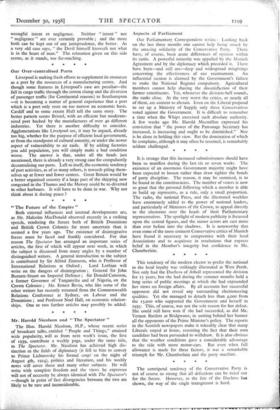Our Over-centralised Ports Liverpool is making fresh efforts to supplement
its resources as a port by the resources of a manufacturing centre. And though some features in Liverpool's case are peculiar—the fall in cargo traffic through the cotton slump and the diversion of passenger traffic (for Continental reasons) to Southampton —it is becoming a matter of general experience that a port which is a port only rests on too narrow an economic basis. Cardiff and to some extent Hull tell the same story. The better pattern seems Bristol, with an efficient but moderate- sized port backed by the manufactures of over 40 different industries. Yet there is another difficulty to consider. Agglomerations like Liverpool are, it may be argued, already too big, whether for the purpose of efficient local government, or from the standpoint of cultural amenity, or under the newer aspect of vulnerability to air raids. If by adding factories you add population, you will simply make a bad condition worse. The answer is that, under all the heads just mentioned, there is already a very strong case for compulsorily decentralising our ports. Left to itself; the economic tendency of port activities, as of so many others, is towards piling them- selves up at fewer and fewer centres. Great Britain would be a better organised country if a large part of the shipping now congested in the Thames and the Mersey could be re-diverted to other harbours. It will have to be done in war. Why not think about it during peace ?
* * * *


































 Previous page
Previous page